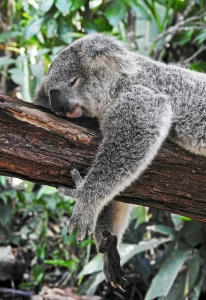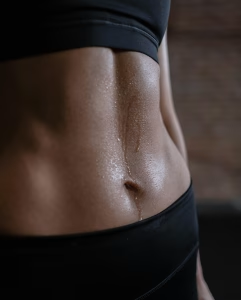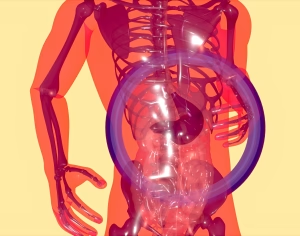Traditional Chinese Medicine
Acupuncture & Chinese Medicine for Nightmares

I’m not sure if what my toddler experiences qualifies as nightmares—she’ll occasionally yell out in her sleep—defiant demands, such as: “I don’t want one! I want TWO!” or, “No, put me down!” which my wife and I imagine are healthy reenactments of infuriating boundaries one of us had to regularly and/or recently hold with her.
For most adults, with greater awareness, a resume of more hardship to induce greater fears, real traumas, and fabricated neuroses, nightmares can be much scarier than being limited to one cookie. Per usual, (in Chinese medicine) they can be the result of a variety of mechanisms (none of which are mutually exclusive to the obvious psychological aspect), however all with one end result: “(Jue Yin) Blood Deficiency.” What is “Jue Yin Blood Deficiency?”
Generally, this means a person is lacking in fluids, such as blood and organ fluids, as well as inhibitory hormones and/or neurotransmitters, such as melatonin, dopamine, or serotonin. Without ample inhibitory substances, excitatory substances have no anchor—they will flare, whether in the form of emotional dysregulation, insomnia, night sweats, or NIGHTMARES.
I read one small study that demonstrated that people who suffer with nightmares also have a blunted cortisol awakening response, which is to say they feel exhausted upon waking, even after a good night’s sleep. Another study showed that specifically ADHD patients are three times more likely to report nightmares. Both instances suggest neuroendocrine disruption due to a deficit of stimulatory hormones, which might seem counterintuitive, as we might suspect that someone in the throes of a nightmare must be overstimulated. In fact, Chinese medicine and modern neuroscience seem to agree that these patients are in fact under-stimulated.
Activating hormones and neurotransmitters do not only activate the mind—they also stimulate the organs, via the hypothalamic pituitary axis, to properly do their jobs, part of which is to produce more substances to harmonize chemical balance in the body.
Stress can dry out these substances, as can poor sleep habits or poor diet. If stress is the cause it is advisable to seek therapy and/or meditation or some kind of spiritual context to reframe one’s suffering. Acupuncture would likely revolve around the gallbladder, liver, stomach, and pancreas vessels. Herbal medicine might revolve around bupleurum, ginseng, licorice, and/or pinellia root.
If someone’s diet is lacking in proper fat or protein this can lead to hypoactivity. Acupuncture might revolve around the stomach, pancreas, and liver vessels, plus the kidney instead of the gallbladder. Herbs might revolve around red dates, rehmannia root, angelica, and/or aconite.
If someone’s diet is excessively fatty or rich, this obviously creates inflammation that suffocates the organs, which causes the illusion of hypoactivity—in fact the organs are working overtime, exhausted as a result. Acupuncture would definitely revolve around the gallbladder and stomach vessels, probably the large intestine, as well as points on the abdomen itself. Herbal medicines might revolve around coptis root, gardenia fruit, and bamboo paper. In call cases points along the scalp above the hypothalamus and/or amygdala can be helpful.
If you or someone you know deals with any kind of nightmares or sleep disturbances, Chinese medicine can absolutely help… unless you live on Elm St. Wishing everyone restful sleep!
Acupuncture’s Abdominal Diagnoses

Contrary to popular belief, there is a great deal of overlap between Chinese and Western medical diagnoses and systems. A good clinician from either should inquire about your metabolism—fluid or otherwise. How often do you pee and poop? Drink water or eat? We both feel patients’ pulses, at the wrist and sometimes even the carotid (throat) and dorsal pedis position on top of the feet. Additionally, I was reminded while (binge)watching The Pitt that Chinese medicine is not the only paradigm that places emphasis on abdominal palpation.
In Western medicine, my understanding is doctors are feeling for any number of things: fluid retention, organs size and shapes, masses or tumors, tenderness, or pain.
Our assessment process is not much different, though as expected, most acupuncturists are less adept at detecting tumors or misshapen organs, and most doctors are not applying their findings to a global/holistic diagnosis. They are ruling out emergency, which has its own obvious value. Acupuncturists, instead, are searching more for subjective signs to fit a pattern diagnosis.
A COLD abdomen means metabolic organs are lacking in blood or healthy gases and requires moxibustion therapy and/or herbal families such as dry fried ginger or aconite stone.
A SOFT abdomen generally indicates fluid retention because of some subjective deficiency of mitochondria and might require herbs such as poria mushroom and tangerine peel to drain the excess fluids, but also aconite stone to engender cellular energy and adrenal function with the hope of preventing further fluid retention.
Tension in the upper abdomen might indicate inflammation, dryness, and a tendency to constipation, whereas tension or sensitivity below the umbilicus points more towards weakness again, and possibly diarrhea. The former often requires rhubarb root, whereas the latter might need a combination of ginseng and evodia fruit. The wrong herbal formula will make symptoms temporarily though immediately worse.
Tension anywhere can indicate local fluid retention and/or blood stagnation that may or may not be the final piece of the puzzle in getting some chronic illnesses to resolve. Local needling and moxibustion can be helpful, as can herbal formulas with peach kernel or peony root.
To the left of the abdomen pertains to metabolic function, specifically and especially between the pancreas and portal vein to the liver, as it is said in Chinese medicine: “Liver blood ascends on the left (side of the body).” In its ascension it acts as a courier for healthy gases and immunological substances, which is why tension here might point to immunodeficiency.
To the right of the abdomen pertains more to the reproductive organs, ovarian function or otherwise. It might also be implicated in chronic constipation, so if you suffer from both for example—menstrual irregularity and constipation—the focus of treatment should be on the lower right abdominal quadrant, hypothesizing that once the bowels regularly move the reproductive organs can regularly function, sans obstruction.
How does your abdomen feel? Is it tight, taut, and thus “dry,” or soft and yielding, thus “damp?” Excessively cold or hot? Tender? Have you ever thought about how it can and should inform your physician? BTW, The Pitt was great! Highly recommend.
NEW Jersey Office!

Not to worry! I have no plans, nor ideations of leaving my New York office, as I’m not sure there’s enough acupuncture in the world to heal me of the inevitable heartbreak of severing all ties with the greatest place on Earth. But I have decided to finally be a reasonable human being and upstanding member of MY Jersey community and start accepting patients there.
In fact, this was partially motivated by reminiscence my brother and I often share over how neither of our parents were ever particularly connected or plugged into the community in which we grew up, in Tappan, New York. Mom was a part of the PTA up to a certain point and Dad came to all my games, but the rest of their respective lives were elsewhere—Dad’s in Manhattan, Mom’s in New Jersey, and when their empty nest began, we think its enjoyment may have suffered as a result. I digress.
Happy to announce that I am now renting space part-time at Studio 509, a lovely space very close to home—almost walkable—in Maplewood, NJ! Schedule by appointment.
In the meantime, my schedule in New York remains unchanged, Mondays and Fridays from 10-7, Wednesdays from 10-4. Please do not hesitate to reach out to schedule, nor to ridicule me for partially selling out for the garden state.
Acupuncture for Stomach Pain

We have all experienced stomach pain. Either we ate something wrong, a medication we took had side effects, it might related to one’s menstrual cycle, and/or be simply chronic digestive issues that have some genetic component. How do we treat this with acupuncture and Chinese medicine?
First, per usual, we must identify the correct pattern.
If someone suffers from chronic constipation and bloating, we can assume the pattern is one of “food stagnation,” which can be corroborated by a dense sensation in the middle finger position of the right radial artery—also by palpating the epigastric region for tenderness. These patients tend to feel overheated, they might experience excessive thirst, insomnia, or irritability, all as a result of the intestinal inflammation. Whether or not there is distention alters the diagnosis.
We can needle points along the stomach and large intestine vessels to move gases out and downward. Depending on the rest of the pattern, we might also use the pancreas or even lung vessels to transfer mitochondria to the former organ vessels, the way one might money from their savings to their checking account, as needed. Herbal formulas indicated tend to revolve around rhubarb root, possibly lily-turf, gypsum stone, or white peony, the latter of which can be especially adept at treating all forms of cramping in the body.
From a western medical perspective, these are patients who might benefit from intermittent fasting and/or a magnesium supplement.
More commonly, stomach pain has to do with our blood. Either it is not moving or not arriving to the local area, leaving the smooth muscles of the organs dehydrated, sent into spasm in search of fluids, but we experience it as, Ouch. My tummy hurts.
In a pattern of “blood stagnation,” acupuncture works exceptionally well. We can use points along the pancreatic or liver vessels to encourage healthy blood movement. We might also use local points around the abdomen—where everyone always wants us to put it—to encourage local vasodilation and the dissolution of amenable masses. Useful herbal families might revolve again around white peony or rhubarb, but also apricot kernel, corydalis, or safflower. Generally, the veins beneath the patient’s tongue will be distended and purple enough to corroborate diagnosis.
Lastly, is blood deficiency, which might be slightly less amenable to acupuncture—more so to moxibustion, herbal medicine, the consumption of red meat, and healthy sleep hygiene. Moxibustion is often more effective at generating mitochondria and healthy fluids than acupuncture. Herbs we might consider are rehmannia, angelica, or even red dates, the latter of which has the added benefit to settle heart palpitations and anxiety.
Since 2 of the 3 physiological patterns for stomach pain pertain to the blood, it is quite common to be menstrual and/or hormonal related. Some patients for whom it is impractical to come every single week can benefit from coming at least just twice a month, the week before and after their cycle begins.
Spring Wind!

Did anyone else notice how many times in the past week the weather said something like 52 but felt more like 32? Spring wind! In the lunar calendar we are already well into spring, the season the ancient Chinese correlated with pathologies of “wind.” What does that mean?
“Wind pathologies,” in Classical Chinese, basically refers to anything that moves within the body. Think joint pains or almost any pains, also neurological tics, from Restless Leg to Parkinson’s disease, finally many dermatological conditions that traverse different body parts and seem to constantly change in shape or surface area covered. Where does it come from?
The pathology of autumn is dryness, hence all the foliage drying up and sinus issues it commonly brings. Following is the bitter cold of winter, which consolidates said climate of dryness, constricts our blood vessels, thereby offering fewer pathways for lubrication, whether to our skin, orifices, or otherwise.
Dryness, in Chinese medicine, whether manifesting as a lack of blood, lack of healthy blood, mucosal metabolic fluids, or parasympathetic neurotransmitters, can give rise to physiological symptoms that might be metaphorically described as “wind.”
Another cause can be literal wind, as it gusts down the avenues and seemingly even turns corners to blow hats off our heads and make 52 degrees feel like 32. This causes a local constrictive response in the head, which contains our autonomic nervous system, which manages a great part of vital organ function. Am I suggesting the entire body is connected and that which accosts the head can in turn accost our entire physiology? Yes. Ask anyone who’s suffered a concussion. What can we do?
Wear a scarf. Wear a hat or a hood. Wear a hood over your hat. Wear a mask beneath the hat beneath the hood above your scarf. You don’t have to be sick or paranoid to wear a mask in the cold and/or windy months of the northeast. You can simply be protecting your many cranial nerves that traverse the face and have far-reaching physiological implications. Modern fashion is such that there are many stylish options for these accessories. With all we have already working against us—modern stress, western diet, the simple biology of aging—doesn’t it make sense to do the simple, little things to prevent or prolong the scale from tipping into Parkinson’s?
As for “wind prevention” by way of treating the root, which is to say nourishing blood and vital fluids, I have mostly the same old boring, science-based advice: Animal protein, eggs, cooked vegetables, small portions of rice or pasta, meditation, and going to sleep before 11pm. As for accessible, food-grade Chinese medicine, tea made from red dates, licorice, and/or pearl barley can also be helpful. For the spring we also recommend more sour foods, kraut, lemon, and/or vinegar with the intention of “astringing” as many of our good fluids as possible.
Lastly, happy Mercury Retrograde, an admittedly somewhat ironic salutation to those who “observe.” Remember to expect delays in transit and traffic and problems in technology and communication. Double check who you’re sending that text or email to. Accept that things will go wrong. Try to breathe. Ask people to clarify before shouting back at them. Breathe again.
(photo from a fun shoot back in 2007, one year pre-Chinese medical school!)

